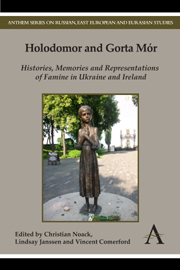Book contents
- Frontmatter
- Contents
- List of Figures
- Acknowledgements
- Introduction Holodomor and Gorta Mór: Histories, Memories and Representations of Famine in Ukraine and Ireland
- Part I Histories, Historiography and Politics
- Part II Public Commemoration
- Part III Trauma and Victimisation
- Part IV New Sources and New Approaches to the Irish and Ukrainian Famines
- Chapter 11 In Search of New Sources: Polish Diplomatic and Intelligence Reports on the Holodomor
- Chapter 12 Oral History, Oral Tradition and the Great Famine
- Chapter 13 Mapping Population Change in Ireland 1841–1851: Quantitative Analysis Using Historical GIS
- Index
Chapter 11 - In Search of New Sources: Polish Diplomatic and Intelligence Reports on the Holodomor
from Part IV - New Sources and New Approaches to the Irish and Ukrainian Famines
Published online by Cambridge University Press: 05 May 2013
- Frontmatter
- Contents
- List of Figures
- Acknowledgements
- Introduction Holodomor and Gorta Mór: Histories, Memories and Representations of Famine in Ukraine and Ireland
- Part I Histories, Historiography and Politics
- Part II Public Commemoration
- Part III Trauma and Victimisation
- Part IV New Sources and New Approaches to the Irish and Ukrainian Famines
- Chapter 11 In Search of New Sources: Polish Diplomatic and Intelligence Reports on the Holodomor
- Chapter 12 Oral History, Oral Tradition and the Great Famine
- Chapter 13 Mapping Population Change in Ireland 1841–1851: Quantitative Analysis Using Historical GIS
- Index
Summary
In recent years we have witnessed a crucial breakthrough in research into the Holodomor. Although many questions are still hotly debated, historians differ with regard to interpretations of the events rather than to the basic facts. A consensus on the list of the most important research areas is beginning to emerge. Undoubtedly, the opening of Soviet archives and the fast processing of new archival sources played a key role. Among them are recently declassified materials, for example documents issued by the Stalinist leadership, state and party administration or the secret services. Beyond that, accounts given by witnesses who went through the hell of the Holodomor have added significantly to the picture.
Documents of foreign provenance which include mainly reports produced by the diplomatic, consular and intelligence services of those states which had missions in the territory of the Soviet Union during the 1930s have likewise contributed to our knowledge. Sources of that type appear to be of interest for at least two reasons. On the one hand, they disclose many previously unknown facts concerning the course of events in Ukraine in 1932–33 and supplement the picture created by the Soviet materials.
- Type
- Chapter
- Information
- Holodomor and Gorta MórHistories, Memories and Representations of Famine in Ukraine and Ireland, pp. 215 - 230Publisher: Anthem PressPrint publication year: 2012
- 1
- Cited by



